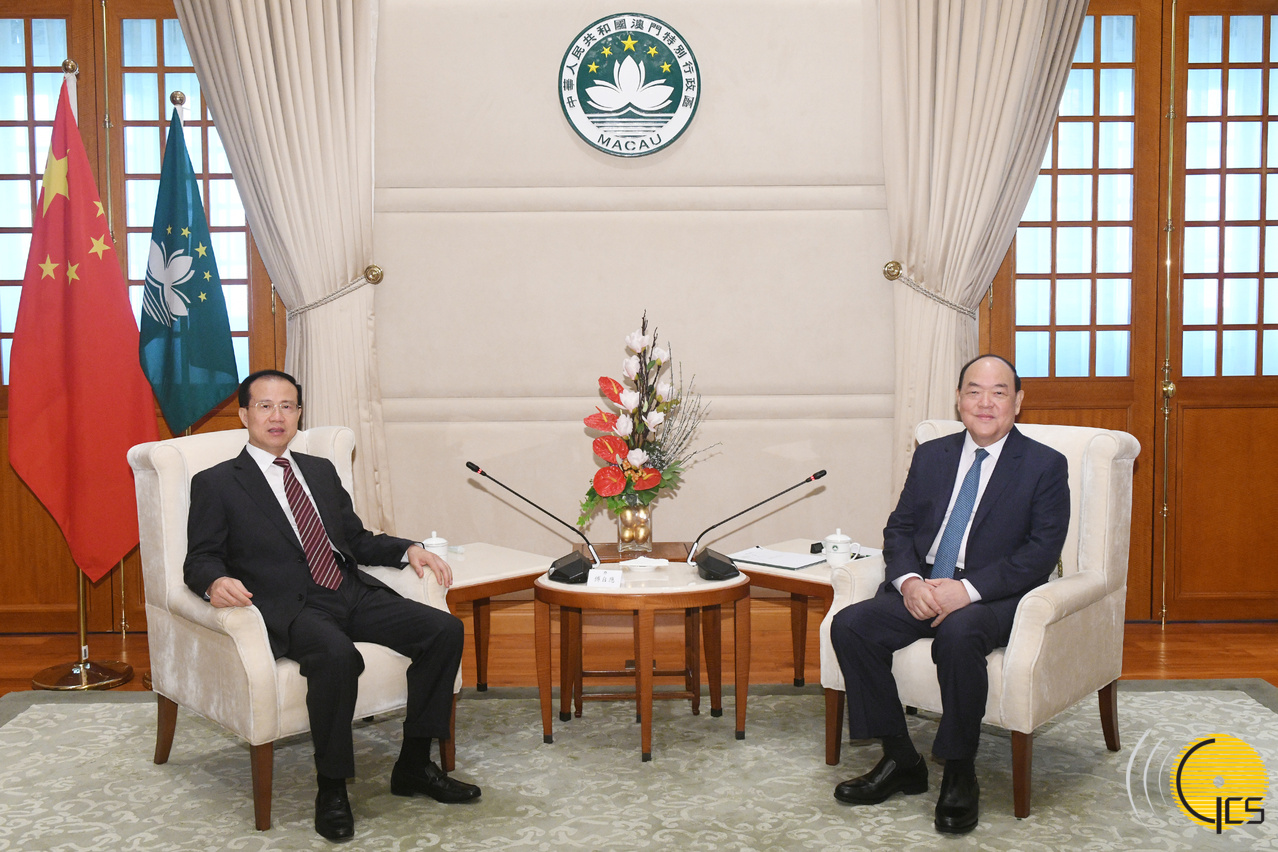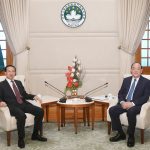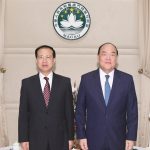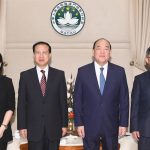 The Chief Executive, Mr Ho Iat Seng, meets with the former director of the Liaison Office of the Central People's Government in the Macao Special Administrative Region, Mr Fu Ziying, at the Government Headquarters.
The Chief Executive, Mr Ho Iat Seng, meets with the former director of the Liaison Office of the Central People's Government in the Macao Special Administrative Region, Mr Fu Ziying, at the Government Headquarters.
The Chief Executive, Mr Ho Iat Seng, today expressed his sincere gratitude to Mr Fu Ziying, former director of the Liaison Office of the Central People's Government in the Macao Special Administrative Region (MSAR), for his contribution to Macao’s development, and his guidance regarding the MSAR Government’s work.
Mr Ho made the remarks during a meeting in the morning at the Government Headquarters with Mr Fu, before the latter’s departure from Macao.
The Liaison Office, as a Central Government agency stationed in Macao, was a major channel for the MSAR Government to reflect the city’s situation to the Central Government, Mr Ho said. Mr Fu, who had been the Liaison Office’s director since 2018, had led the Liaison Office in: fully implementing the duties bestowed on it by the Central Government; resolutely supporting law-based governance of the MSAR Government; firmly safeguarding the country’s sovereignty, safety, and development interests; and in promoting in Macao the core value of patriotism.
The Chief Executive stated Mr Fu had done a great amount of work in a number of areas. That included: helping Macao proactively engage with national strategic development; fostering exchanges between the mainland and Macao; advancing the Guangdong-Hong Kong-Macao Greater Bay Area; coordinating epidemic prevention and control effort; and supporting economic recovery. These efforts were significant in terms of ensuring the stability and prosperity of Macao, added Mr Ho.
Mr Fu had paid great attention to the topic of Macao’s development. Besides building close working relations with the MSAR Government, he had also had friendly relations with the Macao public through close engagement with civil associations, said Mr Ho.
In the future, the MSAR Government would continue its close communication with the Liaison Office, in order to make joint contribution to the implementation of the “One country, two systems” principle, said the Chief Executive.
Speaking in the meeting, Mr Fu thanked Mr Ho and his team for the relationship of close and mutual trust between the MSAR Government and the Liaison Office. During his tenure in Macao, Mr Fu had witnessed the MSAR Government overseeing a number of large-scale activities, including the fifth-term Chief Executive Election, and the celebrations for the 20th anniversary of the establishment of the MSAR.
Over the past two years, the Chief Executive had led the overall response in Macao against the COVID-19 pandemic, and introduced, in a timely way, a number of measures to ensure employment, to boost the economy, and to ease hardships related to livelihood issues, noted Mr Fu. The MSAR Government was devoted to promoting work related to safeguarding national security, to uniting civil associations, and to advancing patriotic education in Macao, he added.
With the support of the Central Government, Macao had seen effective governance and a harmonious society, with stable progress in terms of development. These achievements were well acknowledged by the Central Government, Mr Fu stated.
Mr Fu said he had many fine memories of Macao. He would continue to pay close attention to Macao’s development and support the work of the Chief Executive, Mr Fu added.
The Chief-of-Office of the Chief Executive’s Office, Ms Hoi Lai Fong; the Director of the General Office of the Liaison Office of the Central People’s Government in the MSAR, Mr Song Lihong; and Secretary of the General Office of the Liaison Office, Mr Ye Hong, attended the meeting.




